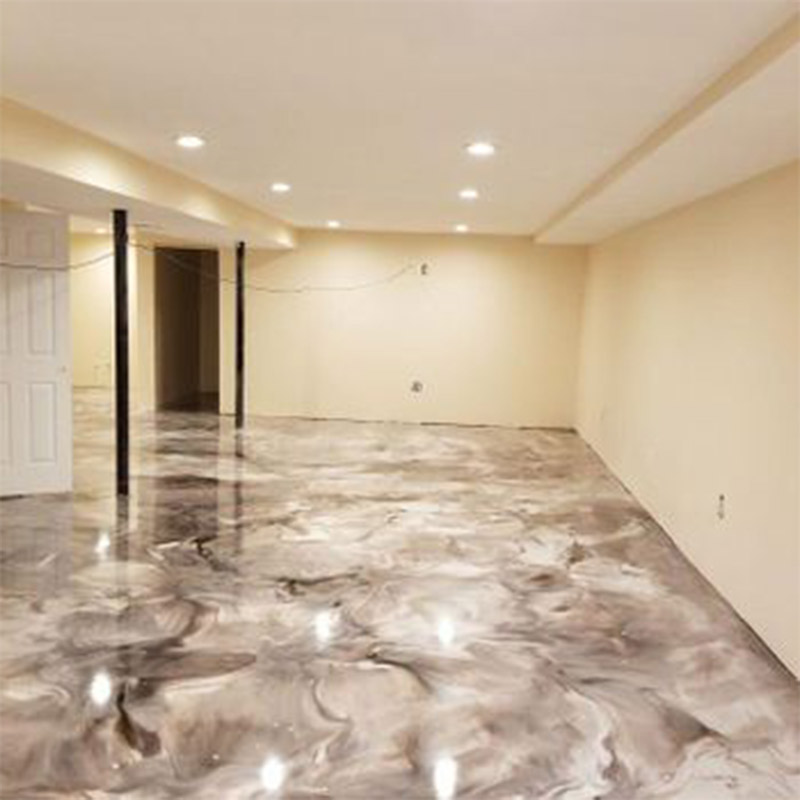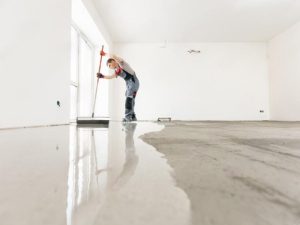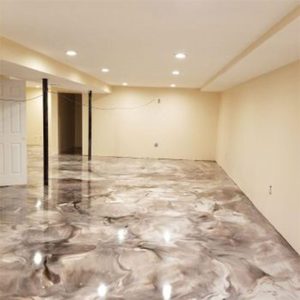Epoxy flooring has emerged as a versatile and innovative solution for enhancing both residential and commercial spaces. With its seamless finish, durability, and aesthetic appeal, epoxy flooring has become a popular choice for homeowners, businesses, and designers alike.
In this comprehensive guide, we will delve into the world of epoxy flooring, exploring its various applications, benefits, and considerations. From its origins in industrial settings to its evolution as a chic and stylish flooring option, epoxy flooring offers a range of possibilities for transforming interior spaces.
Join us as we uncover the versatility, durability, and design potential of epoxy flooring solutions. Whether you’re considering epoxy flooring for your home, office, or retail space, this guide will provide you with the information and inspiration you need to make informed decisions and create stunning interiors that stand the test of time.

Definition and composition of epoxy flooring
Epoxy flooring is a durable and versatile flooring solution characterized by its seamless, glossy finish. It is a type of flooring that involves the application of epoxy resin to a prepared substrate, commonly concrete. The resulting surface is not only visually appealing but also highly resistant to wear and tear, chemicals, and other forms of damage. Epoxy flooring has gained popularity in various settings, including residential, commercial, and industrial spaces, due to its aesthetic appeal, durability, and ease of maintenance.
Composition of Epoxy Flooring:
Epoxy flooring consists of two main components that, when combined, create a strong and resilient surface:
Epoxy Resin:
The primary component is epoxy resin, a thermosetting polymer derived from a chemical reaction between epoxide and polyamine hardeners. This resin forms a tough, rigid material that adheres well to the prepared substrate, providing strength and durability to the flooring.
Hardener:
The second component is the hardener, which initiates the curing process when mixed with the epoxy resin. This chemical reaction results in a rigid, plastic-like material that bonds securely to the underlying surface. The hardener also contributes to the epoxy flooring’s resistance to chemicals, heat, and mechanical stress.
Additional Components and Variations:
While the basic composition involves epoxy resin and a hardener, additional components may be incorporated based on specific requirements or desired characteristics. These can include:
Aggregates: Fine or coarse aggregates like sand or quartz may be added to the epoxy mixture to enhance slip resistance and impact resistance. This is particularly common in industrial settings where safety is a priority.
Colorants: Pigments or dyes can be added to the epoxy mixture to achieve a wide range of colors and patterns. This customization allows for creative design options, making epoxy flooring a versatile choice for various aesthetic preferences.
Sealers and Topcoats: To further enhance durability and appearance, epoxy flooring may be sealed with clear epoxy topcoats. These topcoats provide an additional layer of protection, making the flooring even more resistant to abrasion, UV rays, and chemicals.
Solvents: In some formulations, solvents may be used to adjust the viscosity of the epoxy mixture, making it easier to apply and ensuring a smooth, even finish.
Cost and Investment Value of Epoxy Flooring
The cost of epoxy flooring varies depending on type, design, and area size. Basic epoxy coatings may cost less, while decorative options like metallic or 3D designs are more expensive. Installation complexity also affects pricing, with professional installation generally recommended for long-term durability.
Although the initial investment may be higher compared to vinyl or tiles, epoxy flooring offers excellent long-term value. Its lifespan of 15–20 years, combined with minimal maintenance, results in lower overall costs. In commercial and industrial settings, epoxy reduces downtime for repairs and cleaning, saving businesses money.
Additionally, epoxy enhances property value. For homeowners, epoxy garages or stylish interiors can attract buyers. For businesses, epoxy floors project professionalism and reduce maintenance expenses.
Overall, epoxy flooring is not just a purchase—it is an investment that provides durability, beauty, and financial savings over time.

Different types of epoxy flooring
Epoxy flooring comes in various types, each designed to cater to specific needs and preferences. Here are some common types of epoxy flooring:
Self-Leveling Epoxy Floors:
Ideal for areas where a smooth and seamless finish is crucial, self-leveling epoxy floors are applied to create a flat and level surface. They are commonly used in commercial and industrial settings to provide a polished and durable floor.
Epoxy Mortar Floors:
Known for their exceptional strength and durability, epoxy mortar floors consist of a mixture of epoxy, sand, and hardeners. These floors are highly resistant to chemical exposure, making them suitable for industrial environments where chemical spills are a concern.
Epoxy Flake Floors:
Epoxy flake floors, also known as decorative flake floors, incorporate decorative vinyl flakes into the epoxy coating. This type of flooring is not only visually appealing but also provides a textured surface that enhances slip resistance. It is commonly used in commercial and residential spaces.
Quartz-Filled Epoxy Floors:
Quartz-filled epoxy floors combine epoxy resin with quartz sand. The result is a highly durable and textured surface that offers excellent slip resistance. This type of flooring is often chosen for areas with high foot traffic, such as commercial kitchens and manufacturing facilities.
Epoxy Terrazzo Floors:
Epoxy terrazzo floors blend epoxy resin with a mix of colored aggregates such as marble or glass chips. This type of flooring creates a decorative and highly durable surface, making it a popular choice for commercial and institutional buildings.
Antistatic Epoxy Floors:
Antistatic epoxy floors are designed to dissipate electrostatic charges, making them suitable for environments where electrostatic discharge (ESD) could be damaging, such as in electronics manufacturing or laboratories.
Vapor Barrier Epoxy Floors:
Vapor barrier epoxy floors are specifically formulated to prevent the passage of moisture or water vapor from the substrate to the surface. This type of epoxy flooring is commonly used in areas where moisture resistance is essential, such as basements or areas prone to high humidity.
Solid Epoxy Floors:
Solid epoxy floors are a straightforward, single-color flooring option. While lacking the decorative elements of some other types, solid epoxy floors offer durability, easy maintenance, and a clean, polished appearance. They are commonly used in industrial and commercial settings.
UV-Resistant Epoxy Floors:
UV-resistant epoxy floors are formulated to withstand exposure to ultraviolet (UV) rays without yellowing or degrading. This makes them suitable for outdoor applications or areas with significant exposure to sunlight.
Epoxy Coating for Garage Floors:
Specifically designed for residential garages, epoxy coatings for garage floors provide a durable and visually appealing surface. They offer resistance to chemicals, oils, and abrasion, making them a popular choice for protecting and enhancing garage spaces.
Benefits of Epoxy Flooring
Durability:
One of the primary benefits of epoxy flooring is its exceptional durability. Epoxy creates a tough and resilient surface that can withstand heavy foot traffic, impacts, and various forms of wear and tear. This durability makes it ideal for high-traffic areas and industrial facilities.
Chemical Resistance:
Epoxy flooring is highly resistant to chemicals, including acids, oils, and cleaning agents. This resistance makes it suitable for use in environments where chemical spills or exposure is a concern, such as laboratories, manufacturing plants, and garages.
Easy to Clean and Maintain:
The seamless and non-porous nature of epoxy flooring makes it easy to clean and maintain. It resists stains, and spills can be quickly wiped away, making it an excellent choice for spaces where cleanliness is a priority, such as kitchens, hospitals, and food processing facilities.
Versatility in Design:
Epoxy flooring offers a high level of design versatility. It can be customized with various colors, patterns, and decorative elements. This flexibility allows homeowners and businesses to achieve a unique and aesthetically pleasing look that complements the overall design of a space.
Enhanced Safety Features:
Certain types of epoxy flooring, such as those with anti-slip additives or textured surfaces, can enhance safety by reducing the risk of slips and falls. This makes epoxy flooring a practical choice for areas where safety is a priority, including industrial settings and commercial spaces.
Moisture and Mold Resistance:
Epoxy flooring creates a moisture-resistant barrier, preventing water and moisture from seeping through the floor. This resistance makes it suitable for use in areas prone to damp conditions, such as basements and areas with high humidity. Additionally, its non-porous surface discourages mold and mildew growth.
Long Lifespan:
When properly installed and maintained, epoxy flooring can have a long lifespan. Its resistance to wear and tear means that it can endure for many years, making it a cost-effective flooring solution over the long term.
Quick Installation:
Epoxy flooring can be installed relatively quickly compared to some traditional flooring options. The installation process involves applying the epoxy coating onto the prepared surface, and it typically cures faster than other flooring materials.
Energy Efficiency:
In industrial settings, light-colored epoxy flooring can contribute to energy efficiency by reflecting light. This can reduce the need for additional lighting, leading to energy savings over time.
Environmentally Friendly Options:
Some epoxy flooring formulations are low in volatile organic compounds (VOCs), making them more environmentally friendly. This is particularly important for indoor air quality in residential and commercial spaces.
Types of Epoxy Flooring
Epoxy flooring comes in multiple types, each designed to serve different purposes and environments. The most common is self-leveling epoxy, which creates a smooth, seamless surface and is ideal for commercial buildings, kitchens, and garages. It provides a glossy, attractive finish that enhances the appearance of concrete.
Another type is epoxy mortar flooring, the strongest of all epoxy options. Made from 100% solid epoxies and graded sand, it is perfect for heavy industrial areas that experience extreme conditions. It offers exceptional resistance to impact, chemicals, and abrasion.
Quartz-filled epoxy flooring combines epoxy with quartz grains, creating a durable, slip-resistant surface. This type is ideal for restrooms, cafeterias, and areas requiring both aesthetic appeal and safety.
Anti-static epoxy flooring is designed for environments sensitive to static electricity, such as laboratories, electronic manufacturing plants, and cleanrooms. This flooring prevents static discharge that could damage sensitive equipment.
Finally, decorative epoxy flooring offers unique design possibilities, including metallic and 3D effects. It is increasingly popular in homes, showrooms, and offices for its striking appearance.
Each type of epoxy flooring has unique properties, making it essential to choose the right one based on function, durability requirements, and design preferences.
Epoxy Flooring in Different Spaces
Epoxy flooring, with its versatility and array of benefits, finds applications in various spaces, enhancing both functionality and aesthetics. Let’s explore how epoxy flooring is utilized in different settings:
Residential Spaces:
Garages: Epoxy flooring is a popular choice for garage floors due to its durability and resistance to chemicals and oils. It provides a sleek and polished appearance while protecting the concrete substrate from stains and damage.
Basements: Epoxy flooring in basements adds a moisture-resistant, easy-to-clean surface. It’s particularly beneficial in preventing water damage and offering a visually appealing alternative to traditional basement flooring.
Commercial Areas:
Retail Spaces: Epoxy flooring is commonly used in retail environments for its customizable design options. It can be tailored to match branding elements, creating an attractive and durable flooring solution for shops and showrooms.
Restaurants: The seamless and non-porous nature of epoxy flooring makes it an excellent choice for restaurant kitchens. Its resistance to spills, easy cleaning, and customizable aesthetics contribute to a hygienic and stylish kitchen environment.
Industrial Facilities:
Warehouses: Epoxy flooring in warehouses provides a durable and impact-resistant surface for heavy machinery and foot traffic. It can be customized with safety features such as anti-slip additives, enhancing workplace safety.
Manufacturing Plants: Epoxy flooring’s chemical resistance is valuable in manufacturing plants where exposure to various chemicals is common. It creates a seamless and durable surface that can withstand the demands of an industrial setting.
Healthcare Spaces:
Hospitals: Epoxy flooring is suitable for hospital settings due to its easy maintenance and resistance to chemicals and bacteria. It provides a hygienic flooring solution for areas like operating rooms, laboratories, and hallways.
Clinics: In outpatient clinics and medical offices, epoxy flooring offers a clean and professional appearance. Its resistance to stains and ease of cleaning contribute to a sterile environment.
Educational Institutions:
Schools and Universities: Epoxy flooring is used in educational facilities for its durability and low maintenance. It can withstand high foot traffic in hallways and common areas, providing a long-lasting and visually appealing solution.
Commercial Kitchens:
Restaurants and Cafeterias: Epoxy flooring is an ideal choice for commercial kitchens where hygiene is paramount. Its resistance to stains, ease of cleaning, and customizable design options contribute to a functional and attractive kitchen space.
Automotive Spaces:
- Car Dealerships: Epoxy flooring in car dealerships creates a polished and professional appearance. It withstands the weight of vehicles, resists oil and chemical spills, and contributes to an aesthetically pleasing showroom environment.
- Auto Repair Shops: Epoxy flooring in auto repair shops provides a durable and easy-to-clean surface that can withstand the rigors of heavy equipment and automotive fluids.
Sports and Recreation Areas:
- Gyms and Fitness Centers: Epoxy flooring is popular in gyms and fitness centers due to its durability, shock absorption, and resistance to heavy equipment. It also offers a visually appealing and easy-to-clean surface.
- Indoor Sports Facilities: Epoxy flooring is suitable for indoor sports facilities, providing a resilient surface for activities like basketball, volleyball, and indoor soccer. Its customizable design options can incorporate court markings.
Epoxy Flooring vs. Traditional Flooring
When comparing epoxy flooring to traditional flooring options like tiles, vinyl, or wood, the advantages of epoxy become clear. Traditional floors often require regular maintenance, grout cleaning, or polishing, whereas epoxy provides a seamless, low-maintenance surface.
Durability is one of the biggest differences. Epoxy floors can withstand heavy machinery, foot traffic, and chemical spills without damage. In contrast, tiles may crack under pressure, and wood can warp when exposed to moisture.
Aesthetically, epoxy offers more flexibility. Unlike tiles or vinyl, epoxy can be customized with metallic finishes, 3D effects, and endless color options. This makes it suitable for showrooms, offices, and even modern residential spaces.
Cost is another factor. While epoxy may have a higher upfront installation cost compared to vinyl, its long lifespan and low maintenance reduce expenses in the long term. Traditional floors often need replacement after 5–10 years, but epoxy can last up to 20 years with minimal upkeep.
In terms of hygiene, epoxy surpasses traditional flooring. Its seamless surface prevents dust, mold, and bacteria accumulation, making it ideal for hospitals, kitchens, and laboratories. Traditional flooring, with grout lines and seams, requires more effort to maintain cleanliness.
Overall, epoxy flooring provides superior durability, design flexibility, and long-term savings compared to traditional options, making it the smarter investment.
The Installation Process of Epoxy Flooring
Installing epoxy flooring is a multi-step process that requires precision and proper preparation. The first step involves surface preparation. The concrete base must be cleaned thoroughly, free of oil, dirt, and moisture. Cracks or holes are repaired to ensure a smooth foundation.
Once prepared, the floor is ground or shot-blasted to create a rough surface, improving adhesion. Next, a primer coat is applied to seal the concrete and promote bonding between the epoxy and the surface.
After priming, the epoxy mixture (resin and hardener) is applied. Depending on the desired thickness, multiple layers may be used. For added strength or design, quartz, flakes, or metallic pigments can be added.
Each layer requires sufficient curing time, usually 24–48 hours, before the next layer is applied. Once all coats are completed, a topcoat is added for protection and finish. This final coat enhances durability, chemical resistance, and gloss.
The entire process may take several days, depending on the size of the area and type of epoxy used. Proper installation is critical for longevity, which is why professional installers are recommended.
When done correctly, epoxy flooring creates a seamless, durable, and visually appealing surface that can last decades.
Epoxy Flooring in Residential Spaces
While epoxy flooring is often associated with industrial use, it is increasingly popular in residential settings. Garages are the most common application, as epoxy resists oil stains, tire marks, and heavy tools. However, epoxy’s versatility makes it suitable for kitchens, basements, bathrooms, and even living rooms.
For homes, epoxy offers both practical and aesthetic benefits. It is easy to clean, requiring only sweeping and occasional mopping. Its seamless surface prevents dust, making it ideal for households with allergy sufferers. Additionally, homeowners can choose from countless designs, including metallic and 3D effects, to create unique, stylish interiors.
In basements, epoxy flooring prevents moisture issues, mold, and mildew, offering a long-lasting and attractive alternative to tiles or carpet. In kitchens, epoxy’s stain and chemical resistance make it highly functional. Bathrooms benefit from epoxy’s waterproof properties and slip-resistant options.
Epoxy is also cost-effective for residential spaces. Its long lifespan reduces replacement needs, and its reflective surface brightens rooms, saving on lighting costs.
From functionality to design, epoxy flooring is no longer limited to factories and garages—it is transforming modern homes into stylish, durable, and low-maintenance spaces.
Epoxy Flooring in Commercial Spaces
Commercial spaces require flooring that is durable, attractive, and safe. Epoxy flooring meets all these requirements, making it a popular choice for offices, retail stores, showrooms, and restaurants.
One of the main advantages for commercial use is aesthetic appeal. Epoxy floors can be customized to match brand colors, include company logos, or create modern, eye-catching designs. This enhances customer experience and adds a professional image to the business environment.
Durability is another critical factor. Epoxy withstands heavy foot traffic, shopping carts, and furniture without cracking or fading. It is also resistant to spills and stains, making it ideal for restaurants, cafes, and shopping centers.
For safety, epoxy flooring can be designed with anti-slip finishes, reducing the risk of accidents. Its seamless nature also ensures hygiene, preventing dirt and bacteria buildup, which is particularly important in food and healthcare industries.
From a cost perspective, epoxy is a wise investment for commercial spaces. While the initial installation may be higher than vinyl, its long lifespan and minimal maintenance significantly reduce long-term costs.
In short, epoxy flooring is the perfect solution for businesses seeking durability, safety, and design flexibility in their commercial spaces.
Epoxy Flooring in Industrial Applications
Epoxy flooring is a staple in industrial environments due to its exceptional strength and resistance to extreme conditions. Factories, warehouses, workshops, and laboratories benefit greatly from epoxy’s durability and versatility.
The most significant advantage is resistance to heavy machinery and impact. Forklifts, trucks, and equipment can operate without damaging the surface. Epoxy also resists chemicals, oils, and acids, which are common in industrial settings.
Safety is another benefit. Epoxy floors can include non-slip textures, ensuring worker safety even in wet or oily conditions. Anti-static options are available for industries dealing with sensitive electronics.
Epoxy’s seamless nature makes cleaning and maintenance easy. Dust and debris do not accumulate, reducing downtime for cleaning. In laboratories or food processing plants, epoxy ensures hygiene by preventing contamination.
Industrial epoxy flooring can also be designed with zoning colors or marked pathways, improving organization and workplace safety.
Overall, epoxy flooring enhances durability, safety, and efficiency, making it indispensable for industrial applications.
Epoxy Flooring Designs and Styles
Epoxy flooring is not just functional—it is highly customizable with countless design options. One of the most popular styles is metallic epoxy flooring, which creates a unique, marble-like appearance with shimmering effects. This style is perfect for showrooms, restaurants, and modern homes.
3D epoxy flooring is another trend, using images beneath transparent epoxy layers to create realistic visuals, such as oceans, landscapes, or artistic patterns. This innovative design is widely used in hotels, offices, and luxury homes.
Flake epoxy flooring incorporates colored chips or flakes into the epoxy, creating a textured, decorative look while improving slip resistance. It is often used in garages, gyms, and commercial spaces.
For a more natural appearance, epoxy can mimic granite, marble, or terrazzo, giving homeowners luxurious looks at lower costs. Epoxy also comes in countless colors, gloss levels, and finishes, from high-shine to matte.
The flexibility in design ensures that epoxy flooring is not limited to industrial use but can also create stylish, artistic, and personalized interiors.
Maintenance and Longevity of Epoxy Flooring
One of epoxy flooring’s main advantages is its low maintenance. Unlike carpets or wood, epoxy requires minimal cleaning to maintain its shine and durability. Daily sweeping and occasional mopping with mild detergents keep the surface clean.
Epoxy is resistant to stains, oil, and chemicals, making spills easy to clean without permanent damage. Its seamless surface prevents dust and bacteria accumulation, promoting hygiene.
For longevity, it is essential to avoid harsh chemicals or abrasive cleaners that can dull the finish. Using mats at entrances can reduce dirt and grit that may scratch the surface.
With proper care, epoxy floors can last 15–20 years or more. In industrial settings, additional protective topcoats can extend lifespan even further. Unlike tiles or vinyl, which may need replacement after a decade, epoxy continues to perform well with minimal upkeep.
This durability and ease of maintenance make epoxy flooring a long-term, cost-effective solution for both homes and businesses.
conclusion
In conclusion, the widespread adoption of epoxy flooring across various spaces underscores its versatility, durability, and aesthetic appeal. From residential garages to industrial warehouses, epoxy flooring has proven to be more than just a practical choice—it’s a transformative solution that enhances both functionality and visual appeal.
The most important frequently asked questions about Epoxy Flooring
Is epoxy flooring durable?
Yes, it is highly durable, resistant to wear, and long-lasting.
How long does epoxy flooring last?
Typically 10–20 years with proper care.
Is epoxy flooring resistant to chemicals?
Yes, it is highly resistant to chemicals, oils, and stains.
Can epoxy flooring be slippery?
Yes, but anti-slip additives can be used for safety.






